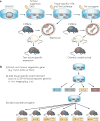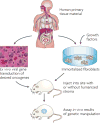Non-germline genetically engineered mouse models for translational cancer research
- PMID: 20574449
- PMCID: PMC4602412
- DOI: 10.1038/nrc2877
Non-germline genetically engineered mouse models for translational cancer research
Abstract
Genetically engineered mouse models (GEMMs) of cancer have affected virtually all areas of cancer research. However, the accelerated discovery of new cancer genes emerging from large-scale cancer genomics and new chemical entities pouring from the drug discovery pipeline have strained the capacity of traditional germline mouse models to provide crucial insights. This Review introduces new approaches to modelling cancer, with emphasis on a growing collection of non-germline GEMMs (nGEMMs). These offer flexibility, speed and uniformity at reduced costs, thus paving the way for much needed throughput and practical preclinical therapeutic testing models.
Conflict of interest statement
The authors declare competing financial interests; see Web version for details.
Figures



References
-
- Sharpless NE, Depinho RA. The mighty mouse: genetically engineered mouse models in cancer drug development. Nature Rev Drug Discov. 2006;5:741–754. - PubMed
-
- Huettner CS, Zhang P, Van Etten RA, Tenen DG. Reversibility of acute B-cell leukaemia induced by BCR-ABL1. Nature Genet. 2000;24:57–60. - PubMed
-
- Jonkers J, Berns A. Conditional mouse models of sporadic cancer. Nature Rev Cancer. 2002;2:251–265. - PubMed
-
- Chin L, et al. Essential role for oncogenic Ras in tumour maintenance. Nature. 1999;400:468–472. The first conditional transgenic mouse model to demonstrate solid tumour regression on extinction of the initiating oncogene. - PubMed
Publication types
MeSH terms
Grants and funding
LinkOut - more resources
Full Text Sources
Other Literature Sources
Molecular Biology Databases

